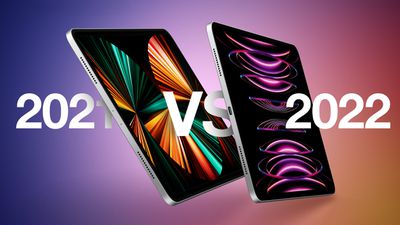The new iPad Pro has now replaced the previous model from 2021 in Apple's tablet lineup, but how different are the two successive iPad Pro generations?

In April 2021, Apple unveiled new iPad Pro models, adding the M1 chip, a Thunderbolt port, 8GB or 16GB of RAM, up to 2TB of storage, an upgraded front-facing camera with Center Stage, Smart HDR 3, and extended dynamic range video, as well as a mini-LED display on the 12.9-inch model. These iPad Pro models have now been discontinued by Apple and prices for the devices at third-party resellers are falling. As such, some customers may be weighing up whether to buy the 2021 iPad Pro or the new, 2022 models.
The iPad Pros from 2021 and 2022 share the overwhelming majority of their features, so should you consider buying or sticking with the older model to save money? This breakdown also serves as a way to clearly see all the differences that the new iPad Pro brings to the table.
iPad Pro 2021
- M1 chip with 8-core, 3.2GHz CPU and 8-core GPU
- 68.25GB/s memory bandwidth
- Neural Engine
- Media engine for hardware-accelerated H.264 and HEVC
- Video encode and decode engine
- Image signal processor (ISP)
- Smart HDR 3
- Wi‑Fi 6
- Bluetooth 5.0
iPad Pro 2022
- M2 chip with 8-core, 3.49GHz CPU and 10-core GPU
- 100GB/s memory bandwidth
- 40 percent faster Neural Engine
- Media engine for hardware-accelerated H.264, HEVC, ProRes, and ProRes RAW
- Higher-bandwidth video decode engine
- Video encode and decode engine
- ProRes encode and decode engine
- "New" image signal processor (ISP)
- Smart HDR 4
- ProRes video recording up to 4K at 30 fps
- Wi‑Fi 6E
- Bluetooth 5.3
- Apple Pencil hover
Most of the advantages of the new iPad Pro come from the M2 chip, which offers a 15 percent faster CPU and a 35 percent faster GPU. The chip's 16-core Neural Engine can process 40 percent more operations per second, while offering almost double the memory bandwidth to aid multitasking and working with large assets. With a new media engine, the iPad Pro can capture ProRes video for the first time, and encode the footage up to three times faster. While this may be beneficial to some users, very few people have professional workflows that can take advantage of the iPad Pro's power and most prospective customers do not need more than the 2021 model's M1 chip.
Apple Pencil hover provides a new way to interact with the iPad Pro, with the pencil being detected up to 12mm above the display, allowing users to see a preview of their mark before they make it. This makes sketching and illustrating more precise, and text fields and icons automatically expand below the Apple Pencil. While this is likely to be useful to illustrators and Apple Pencil fans, it is unlikely to be a major motivation to buy the latest model.
Overall, the 2022 iPad Pro is a very minor upgrade over the 2021 model, with the M2 chip and Apple Pencil hover being the only significant changes, meaning that it is difficult to recommend upgrading. Many 2021 iPad Pro users will likely not be able to justify upgrading to the latest model, but some customers coming from an older version of the iPad Pro could still have good reason to preference the latest models, especially those who need maximum performance and use the Apple Pencil for note taking and illustration heavily. The two iPad Pro models are very similar, so customers who have an older iPad and are looking for an upgrade may prefer to look for a discounted 2021 model.























